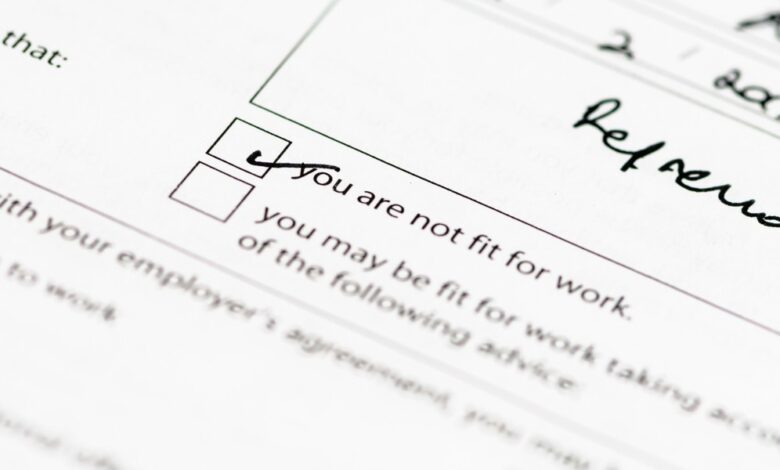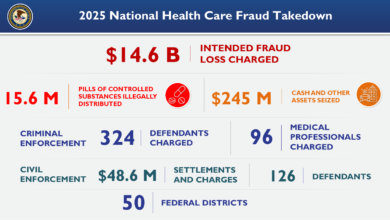Controversial sick note consultation splits healthcare opinion

Prime minster Rishi Sunak has today announced plans to review the way people are signed off work with long-term health conditions, sparking a largely negative response from healthcare organisations.
He attacked what he dubbed “sick note culture” and suggested general practices be stripped of the ability to issue fit notes and that monetary Personal Independent Payments (PIP) be scrapped among others.
“Instead of hostile rhetoric on benefits, ministers should be recruiting to fill the huge gaps in the NHS workforce”
Christina McAnea
These proposals will be reviewed as part of an upcoming consultation, the prime minister said, stating: “People should stop over-medicalising the everyday challenges and worries of health.”
In a speech on welfare, Mr Sunak announced the review of the fit note system in order to stop what he said was people being written off as “not fit for work” by default.
Instead, he suggested a new system should be designed where each fit note conversation focused on “what people can do with the right support in place, rather than what they can’t do”.
As part of this, he said the government would consider shifting the responsibility for issuing fit notes away from “already stretched GPs”.
It would move “towards specialist work and health professionals who have the dedicated time and expertise to provide an objective assessment of someone’s ability to work and the tailored support they may need”, he said, without defining who this group of professionals would be.
Speaking at the Centre for Social Justice, Mr Sunak said: “Anyone who has suffered mental ill health or had family or friends who have knows these conditions are real, and they matter.
“Just as it would be wrong to dismiss the growing trend, so it would be wrong to merely sit back and accept it because it’s too hard, too controversial or for fear of causing offence.
“Doing so would let down many of the people who the welfare system was designed to help,” he added.
According to NHS figures published last year, sickness absences among the health service workforce remain “stubbournly high”, with many nurses off sick due to mental ill health.
Repeated calls by health unions have been issued to improve support for healthcare workers with long-term mental and physical health conditions.
However, Mr Sunak’s announcement today proved controversial and unions, charities and some health professional organisations have condemned his approach to the issue as an attack on disabled people.
Professor Pat Cullen, general secretary and chief executive of the Royal College of Nursing (RCN) said Mr Sunak’s comments were “deeply offensive” to the nursing profession.
“Nursing staff are the largest single workforce in health and care, but they themselves are suffering from increasingly poor long-term health,” said Professor Cullen.
“The prime minister’s overtures about ‘sicknote culture’ will be deeply offensive to a profession hit hard by long COVID and a spiralling mental health crisis. Issues of population health are not ones that a government can simply instruct away.
“All workers require an occupational health assessment ahead of a possible return to work following long-term sickness and trade unions will continue to demand employers adhere to them.”
The British Medical Association (BMA) echoed criticism from opposition and Labour Party leader Sir Keir Starmer. A BMA spokesperson accused the prime minister of “hostile rhetoric”.
Similarly, Unison – which represents public sector workers including nurses, midwives and healthcare assistants – urged the prime minister to instead prioritise workforce issues within the NHS.
Unison general secretary Christina McAnea warned that a cut to disability welfare was “not the way” to improve the country’s health.
“Instead of hostile rhetoric on benefits, ministers should be recruiting to fill the huge gaps in the NHS workforce,” said Ms Anea. “That would increase capacity and allow more patients to be seen.”
She said: “Boosting pay to persuade experienced staff to remain in the health service is key too. But it’s now more than a fortnight since the government should have announced this year’s NHS pay rise.
“Threatening to remove benefits and forcing sick and disabled people further into poverty is most definitely not the way to increase the health of our sick nation.”
The Society of Occupational Medicine (SOM), meanwhile, backed a review of the fit note system but asked ministers to improve access to occupational health and reduce “barriers” to using notes to their full potential.
A statement from SOM, which represents healthcare professionals working in occupational health, called for comprehensive training on fit note use for clinical curricula and better use of a “may be fit” conclusion by those issuing the notes.
It added: “Discussing the merits of the ‘may be fit for work’ section, or a shorter review period before reassessment can be perceived as punitive by patients who expect to get ‘signed off’ and find it difficult to understand why their GP team would challenge this.
“That is why SOM is calling for tailored occupational health advice to be made available to patients who receive the fit note – with better use of the ‘maybe fit’ for work section.”
Professor Gwenllian Wynne-Jones, from Keele University, added: “There is a clear need for better support for those struggling at work through better access to occupational health.
“However, we must ensure that we don’t disassociate the health system and healthcare professionals from supporting people to work, said Professor Wynne-Jones, a leading occupational health researcher.
“Effective management of sickness absence requires all stakeholders to be engaged in supporting people to manage their health work,” she added.






